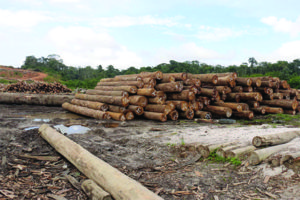 The United Kingdom Government has made a decision to cease the importation of greenheart from Guyana on the grounds that the logs are not coming from sustainably managed forests, a move which has left both the local private sector and government contemplating their next move.
The United Kingdom Government has made a decision to cease the importation of greenheart from Guyana on the grounds that the logs are not coming from sustainably managed forests, a move which has left both the local private sector and government contemplating their next move.
The decision is costing Guyana millions in revenue, since greenheart accounts for 90 per cent of exports to the UK.
The trade took a drastic nose-dive in 2014 all the way to August, 2016. It has been reported that in 2015 there was a 65 per cent decline in the trade, with the industry bringing in US$1,143,706.40 earnings— a marked decline in the 2014 earnings (US$ 3,245,338.24).
Currently, both parties are in discussion with the local logging companies and other affected stakeholders to iron out the issue.
Chairperson of the Guyana Manufacturers Association, Mahindra Chand, noted that the decision has the ability to ruin Guyana’s forestry image; it has already tarnished Guyana’s Sustainable Forest Management efforts, while negatively impacting the level of local and foreign investments.
“The decision has brought on the introduction of a non-tariff barrier, double standards and regulation. It also directly impacts value-added, jobs, businesses, while causing thousands of indigenous people to be unemployed,” he explained, adding that foreign exchange is being lost, and rural livelihood and development are stymied due to lost opportunities even with the FLEGT in place.
He said too that the decision was made without consultations with the forest authorities and stakeholders.
According to Chand, in May 2015, the UK Environmental Agency issued a technical note or an advisory to its contractors for the Government funded projects which state inter alia “greenheart from Guyana” is not currently available from category ‘A’ certified legal and sustainable sources. He stated that category ‘A’ indicated that the timber is not certified.
He expounded that there is currently insufficient Category ‘B’ Evidence (based on the UK Government requirements) to prove it is from sustainably managed forests, though there is adequate evidence to prove legality.
“So they have singled out greenheart to say that there isn’t sufficient evidence for it to qualify under category b,” he said, adding that the UKEA’s technical note went on to state that a decision has been made that we will apply timber procurement policy rigorously and that we will only buy timber from legal and sustainable sources.
This currently prohibits the purchase of new greenheart from Guyana as it does not have sufficient evidence based on the UK government requirements that forests origin are sustainably managed.
He stated that since the issuance of the advisory the UK contractors have been forced not to use greenheart even though it is and always will be the best timber for the job.
Notably, he said on September 27, 2016 the British High Commission responded that there is no change in the UK Government’s procurement policy and that the requirement remains for legal and sustainable products that can be confirmed either by a FLEGT license, by an independent forest certification scheme or provide other evidence that meets the criteria.
The British High Commission Chand related, stated that it is the responsibility of individual UK Government departments to follow this guidance.
Chand however urged the Guyana Government to rectify the matter since jobs and businesses are being lost, along with rampant unemployment in Indigenous communities.
He recommended that the Government of Guyana, through its High Commissioner in London, should contact the relevant UK Government Ministry with responsibility for UKEA to begin talks or negotiations.
He suggested further that the forest sector (the GMSA/FPA) and the GFC should help to prepare the necessary documentation to confirm compliance with Category B and WTO implications.
Minister of Business Dominic Gaskin indicated that any problem that affects local industries does concern the government and “greenheart is more than a local industry, it is part of our Guyanese identity.”
This particular problem, he said, is having a harmful effect on greenheart products and that government was aware of it for some time and has been engaging the local private sector.
Meanwhile, Minister of Natural Resources, Raphael Trotman, promised that they will link hands to find a solution, adding that the government has met with the Private Sector Commission to develop a plan of action forthe issue.
He indicated that, “despite whatever mischief has been put into the public domain” Guyana’s verification system has been tested and proven legitimate.



